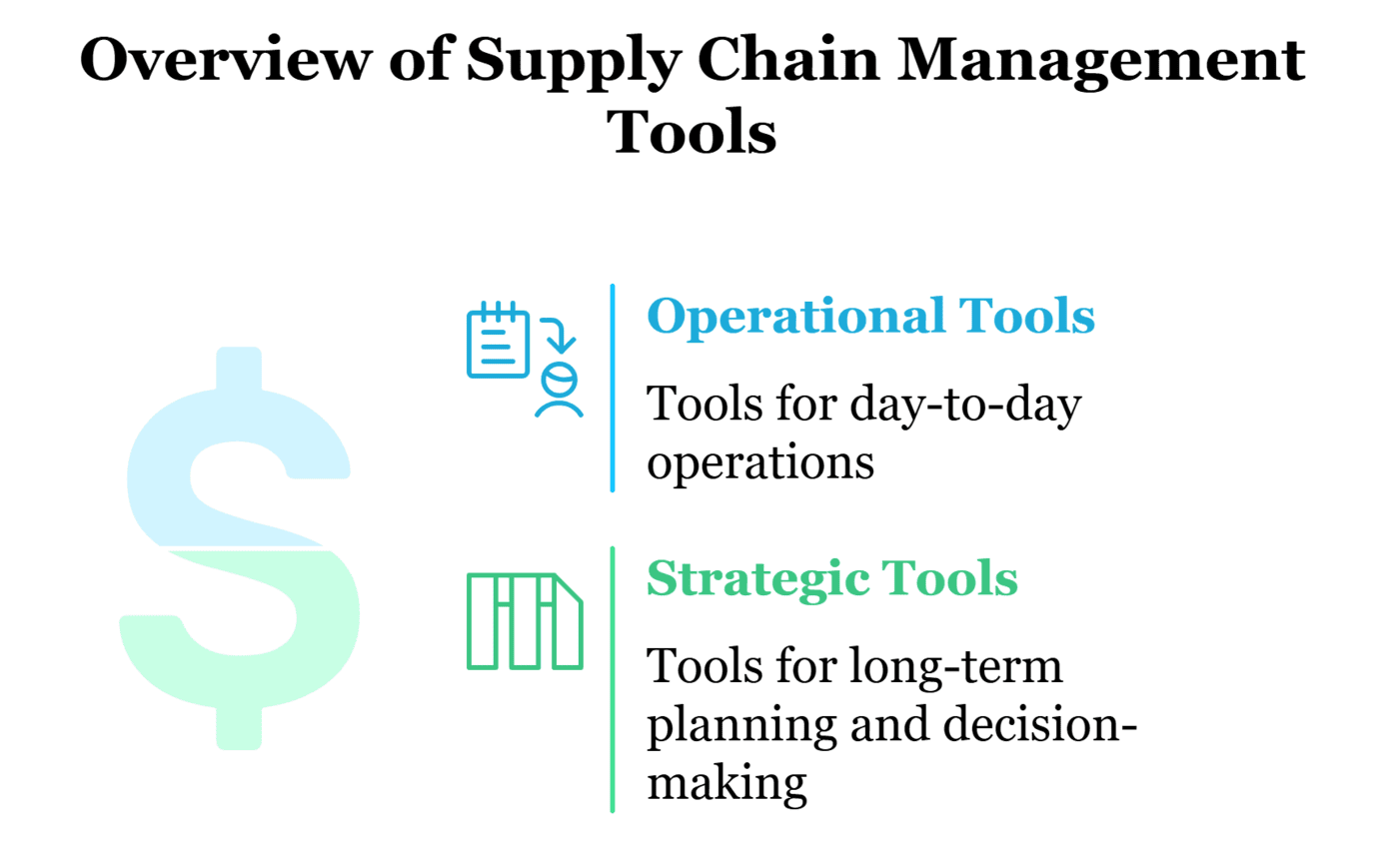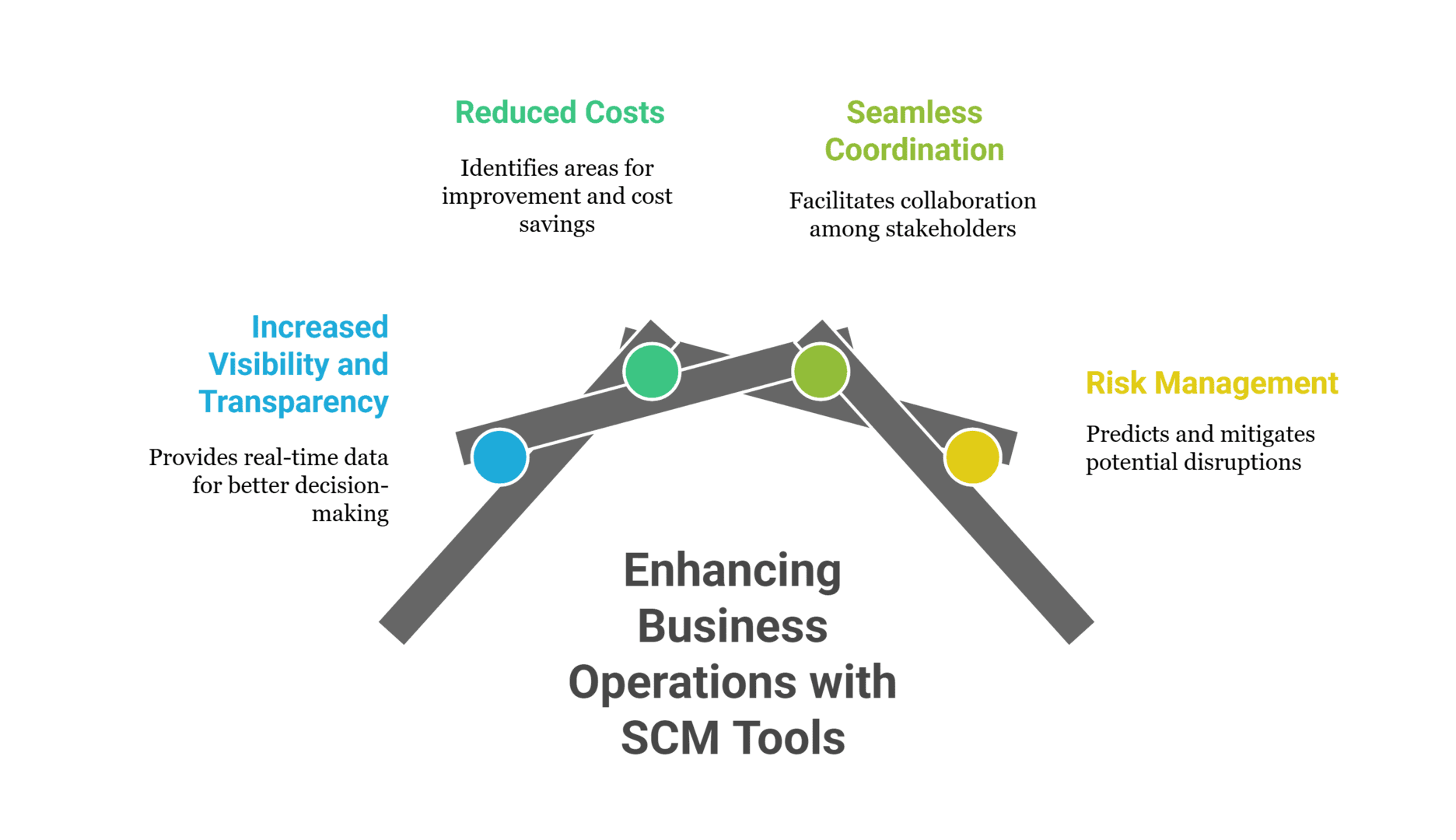15 Supply Chain Management Tools You Need to Know
Table of Contents

- jaro Education
- 15, June 2023
- 2:20 am
Today, the strength of a business depends greatly on its supply chain. Efficient control over your supply chain makes a big difference in the success of both startups and large enterprises. That is why we need Supply Chain Management (SCM) tools.
With so much availability today, how do you select the tools that will fit your business needs? Which characteristics matter the most? What platforms are truly yielding success this year?
In this post, we’ll look at the top supply chain management tools you should learn about, no matter if you’re in logistics, procurement, or operations. We will discuss tools and technology that make operations easier, reduce expenses, and help businesses compete in the modern market.
Want to turn your supply chain into something that benefits your company? We will look at the 15 best Supply Chain Management Tools that are helping to modernize logistics and operations.
Understanding the Supply Chain
The network of businesses, resources, tasks, and procedures involved in the manufacture, acquisition, transformation, and distribution of products or services to clients is referred to as the logistics and supply chain management course. It includes the full path taken by goods or services, from conception through consumption.
Various entities, such as suppliers, manufacturers, distributors, retailers, and end customers, comprise a typical supply chain management course. To maintain the efficient movement of supplies, information, and funds along the supply chain, these organisations cooperate and coordinate their efforts.
Categories of Supply Chain Management Tools
Supply chain management tools streamline inventory management, enhance customer service, and optimize operations. Originally designed for manufacturing firms, these tools have expanded to other industries, enabling businesses to reduce costs and boost efficiency.
They work with ERP and CRM software, offering comprehensive insights into business operations and customer behavior. These tools fall into two categories:

- Operational Supply Chain Management Tools
Operational Supply Chain Management Tools encompass various functions within an organization, such as Order Management, Product Sourcing & Procurement, Transportation Management, Inventory Management, and Demand Forecasting & Replenishment. These tools facilitate day-to-day operations and ensure smooth processes.
- Strategic Best Supply Chain Management Tools
Operational best Supply Chain Management Tools encompass various functions within an organization, such as Order Management, Product Sourcing & Procurement, Transportation Management, Inventory Management, and Demand Forecasting & Replenishment. These tools facilitate day-to-day operations and ensure smooth processes.
Top 15 Supply Chain Management Tools Every Professional Should Know
Although there are many best supply chain management tools available, the following are 15 crucial ones that are frequently used in the industry.
1. Warehouse Management Systems
Warehouse management systems (WMS) play a crucial role in monitoring product movement, inventory levels, and overall warehouse operations. From receiving and storing to shipping and picking, WMS tracks and provides valuable data that enables companies to optimize their supply chain management course while minimizing costs.
Best Supply Chain Management Tools:
- Manhattan Warehouse Management
- HighJump WMS
- Katanas
2. Request For Proposal Software (RFP)
An RFP (Request for Proposal) is a request sent to vendors or suppliers to submit proposals for goods or services needed by a company. It can be issued formally or informally based on budget and requirements. The entire process is automated online thanks to cloud-based RFP systems like BidSync, which eliminate the need for manual interaction from within the company (except for IT staff who are familiar with the system).
3. Order Control
The buy-order process for goods and services is streamlined and automated by order management software. By allowing businesses to quickly submit orders, it facilitates the streamlining of operations. Users may quickly check the status of each purchase and get the information they need, as it is backed by real-time tracking facilities along with historical data access.
4. Alerts & Updates on Shipping Status
With this system, you can effectively manage your supply chain management tool and guarantee on-time shipment delivery. To assist you in streamlining operations, it provides important shipment information. Benefits include receiving alerts for delayed or damaged shipments, enabling prompt action, and ensuring customer satisfaction. Shipping Status Alerts and Updates are essential for companies prioritizing on-time and intact deliveries.
5. Inventory Management
A key component of the logistics and supply chain management course is inventory management, which guarantees effective operations and avoids stock-outs. It includes monitoring replenishment, optimizing stock control, and monitoring inventory levels. Organizations can shorten these procedures and more effectively monitor their inventory levels by utilizing inventory management software.
6. TMSs, or Transport Management Systems
Companies can monitor and manage their shipments across a variety of carriers, including freight forwarders, railroads, airlines, and trucking firms, through transportation management systems (TMS).
A TMS minimizes the need for human coordination between several carriers or providers by combining various transportation modes onto a single platform. Companies can streamline their transportation operations using this method, which also helps them avoid the difficulties of handling each stage separately.
7. Product Purchasing and Sourcing
The process of finding and assessing possible vendors or suppliers for a certain good or service is known as product sourcing. Before signing contracts with the selected supplier, it entails negotiating several issues, including pricing, delivery details, quality requirements, and other terms and conditions.
In logistics and supply chain management courses, wise product procurement is essential since it directly impacts the business’s financial health. Making informed decisions during this process is essential to minimize risks and ensure favorable outcomes for the organization.
8. Demand Forecasting and Replenishment
Demand forecasting is a crucial practice that involves predicting future demand for products or services based on historical data. By leveraging this data, companies can effectively plan and avoid scenarios of product shortages or excessive inventory.
Through demand forecasting, organizations can determine the required quantity of products for specific timeframes, such as monthly or quarterly, allowing them to restock their inventory when necessary and maintain optimal stock levels.
9. Shipping Management
Shipping management tools are indispensable for large organizations seeking to optimize and automate their shipping operations. These tools simplify the tracking of shipments and facilitate efficient management of delivery schedules. Moreover, they enable users to generate and print labels for different products, significantly reducing manual efforts throughout the shipping process.
10. Supply Chain Visibility
Supply chain management course visibility entails having real-time access to critical information regarding the location of goods within a supply chain management jobs network. This visibility encompasses understanding the origin and destination of goods, as well as detecting and addressing any unforeseen disruptions or delays that may occur along the way.
By attaining logistics and supply chain management course visibility, organizations gain valuable insights into the speed and efficiency at which goods traverse their network, allowing them to make informed decisions and optimize their supply chain operations.
11. Order Fulfilment
Order fulfillment is the entire process, from order entry through final client delivery of the goods. Large businesses automate and streamline this process with order fulfillment systems. Users of these systems can automate a variety of processes, such as order processing, inventory management, and delivery.
Businesses may improve operational efficiency and overall consumer satisfaction by utilizing order fulfillment systems. These assets are required to provide accurate and effective order fulfillment, which boosts client satisfaction and loyalty.
12. Bid & Spend
A web-based tool called “bid and spend” is available for businesses to help with procurement procedures. Using this technology, users can create an online marketplace where contractors can post job-related bids.
Consumers can evaluate the bids based on criteria like price and quality to make the best decision. Bid and spend tools allow users to analyze spending levels and examine budgets over time, in addition to being tools for logistics and supply chain management courses.
13. A B2B eCommerce
B2B eCommerce enables companies to sell products directly to other companies, circumventing consumer intermediaries. It typically involves online marketplaces but can also include direct sales through phone or email. Manufacturers often utilize B2B eCommerce to swiftly move excess inventory without resorting to discounted retail channels like Walmart.
14. Specialised Freight Handling
Freight management is a vital aspect of the supply chain management course, encompassing various tasks such as warehouse space management and ensuring timely product deliveries. It plays a pivotal role in the success of a business, as efficient freight management can contribute to the smooth flow of goods and overall operational effectiveness.
Conversely, ineffective freight management can lead to delays, disruptions, and potential negative impacts on customer satisfaction and business outcomes. Therefore, prioritizing effective freight management is crucial for the overall success of a business within the logistics and supply chain management course.
15. Lean Inventory
An effective and economical method of managing inventory is lean inventory. Instead of hoarding goods or resources, it entails buying only what is required when it is required. Businesses can reduce the difficulties of selling overstock items at a loss by eliminating excess inventory. By ensuring that products are ordered to fill specific requests, lean inventory minimizes waste and enhances inventory control in general.
How Supply Chain Management Tools Enhance Business Operations
These tools of supply chain management courses give rise to many opportunities for businesses to become more agile, efficient, and economical. Let us analyze how these tools are changing supply chain operations:

Visibility and Transparency are Increased
Supply chain tools can provide insight into the entire logistics and supply chain management course. These tools can collect real-time data that would enable organizations to keep track of inventory, track shipment status, and measure supplier performance. Thus, decisions could be better made, with reduced chances of disruption.
Reduced Costs
With the help of an SCM tool, an organization can identify areas in need of improvement in its processes or bottlenecks that need to be resolved, thus giving rise to considerable possibilities for cost reductions. For instance, in TMS software, route optimization may yield savings in fuel, and demand forecasting tools would assist in managing inventory effectively to prevent overstocking or understocking.
Coordination in a Seamless Manner
Supply chain management tools will also serve to promote collaboration among the supply chain with multiple stakeholders, including suppliers, manufacturers, and distributors. Supply chain management tools align and direct the present parties toward a common goal by providing a centralized communication platform and data exchange platform.
Managing Risk
Another crucial utility offered by SCM tools is their capacity to predict and avert threats. The demand forecasting and predictive analysis module allows firms to forecast the probable UPS disruptions and to take a proactive stance to minimize the adverse effects of the logistics and supply chain management course.
Supply Chain Management Career: Opportunities And Growth
The MBA in Logistics and Supply Chain Management will help you build a career in one of the fastest-paced and most evolving industries. It emphasizes various aspects, including leadership, strategy, and industry-aware knowledge. The course prepares the graduates to handle these complex supply chain systems by optimizing operations and further developing efficiencies.
Here is a table with NIRF-ranked universities in India offering MBA in Logistics and Supply Chain Management or similar courses:
University Name | Course Name | NIRF Ranking |
Indian Institute of Management Ahmedabad (IIMA) Indian Institute of Management Bangalore (IIMB) | Post Graduate Program in Management (PGP) with Logistics Focus MBA with Supply Chain and Operations Management | 1
2 |
Indian Institute of Management Calcutta (IIMC) | MBA with Operations and Supply Chain Management | 3 |
Indian Institute of Technology Bombay (IITB) | MBA in Supply Chain Management | 4 |
Indian Institute of Management Lucknow (IIML) | MBA with Supply Chain and Operations | 5 |
XLRI Xavier School of Management, Jamshedpur | PGDM with Logistics and Supply Chain Management | 8 |
Transform Your Career with Jaro Guidance in Supply Chain Management
Supply chain management courses are now recognized as an important competitive factor concerning businesses worldwide. Hence, with the rising demand for trained professionals, anyone able to possess the right knowledge and skills would have an upper hand in this competitive industry. Jaro Education guidance presents a wonderful opportunity for any professional who is willing to upgrade themselves to a higher level through extensive training in the Supply Chain Management course. With all the industry-related curriculum, expert guidance, practical learning experiences, and convenient learning options, Jaro will prepare you for becoming a leader in the logistics and supply chain management course.
Start building your career today. Transform your professional life through the Jaro Education guidance in the Logistics and Supply Chain Management course and step into a world of never-ending opportunities with great confidence.
Takeaway
For procedures to be streamlined, processes to be more effective, and logistics and supply chain management courses to be managed, supply chain management tools are crucial. Having a solid understanding of how to use these tools could be highly beneficial for businesses across all industries.
Frequently Asked Questions
Supply chain management tools are software solutions and platforms used to plan, manage, and optimize supply chain operations, including procurement, logistics, inventory, and distribution.
They enhance efficiency, reduce costs, improve visibility, and ensure smoother operations across the entire supply chain network.
Core functions include demand forecasting, inventory management, order processing, logistics tracking, procurement, and supplier relationship management.
SCM tools are used by supply chain professionals, logistics managers, procurement officers, and operations teams in manufacturing, retail, e-commerce, and distribution sectors.
Yes, many SCM tools are scalable and offer flexible pricing, making them suitable for startups and small businesses.










2 thoughts on “15 supply chain management tools you need to know!”
Very informative! This blog outlines essential supply chain management tools clearly. Thanks for sharing these valuable insights!
Very informative! This blog outlines essential supply chain management tools clearly. Thanks for sharing these valuable insights!